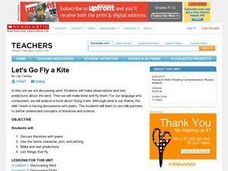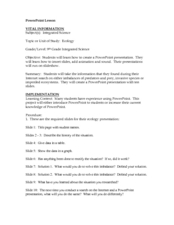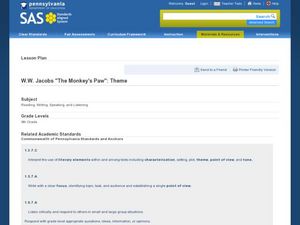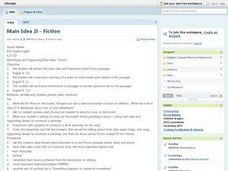Curated OER
GODS OF THUNDER: Myths and Mythical Characters
Students explore the myths and legends of the Ancient Greek and Romans in the ten lessons of this unit. Students compare and contrast the myths and the cultures that created them. Norse myths are included in this unit.
Curated OER
Science: Let's Fly a Kite!
Students make observations about the wind and develop predictions to test with kites. The lesson's Language Arts component invloves communication of concepts with peers. On their kite flying day, students discuss how the wind and air...
Curated OER
Multimedia Final Project
Students work with a partner to compile a new movie. They comprehend tat the movie requres a lot of preparation and media releases. Students use one computer, create the serval different materials for their film: A Publisher Flyer...
Curated OER
Imagining Your Science Fiction Short Story
Twelfth graders brainstorm ideas for their own science fiction story. Using worksheets, they sketch the plot and setting for their story. They create appropriate characters and develop their interactions among each other. They share...
Curated OER
Humorous Story Featuring Clowns
Middle schoolers write stories that feature funny clowns. In this creative writing lesson, students follow the outline for a story in order to write their own humorous story set at a circus.
Curated OER
Ecology
Students personify ecology vocabulary and write a one-act play using their knowledge of ecology as the basis for characters, conflict, setting and plot.
Curated OER
The Great American Fire Drill
Students read a story about fire safety and create their own ending to the story in order to learn about fire escape plans and to demonstrate their writing skills. In this fire safety lesson, students discuss the parts of a story, read...
Curated OER
Story Writing
Students work in groups to create a story that will be presented to the class. In this story writing lesson, students complete a project planning sheet, work together to create a story that includes a hero and at least two other...
Curated OER
Game Plans
Pupils consider the online game Neopets as a springboard to developing the characters, settings and plots for online fantasy games. They draft technical plans that describe how their games be presented and played on the We
Curated OER
Using Facebook with Literature
Young scholars use online social networking to learn about characters in literature. In this literature and technology lesson, students visit Facebook website and set up character profiles for a piece of literature they've read.
Curated OER
Outline of a Legend/Folk Tale
Students create outlines of folk tales and legends. They read a folk tale or legend in the target language. They complete an outline of the key events of the story including the main characters, plot, story elements and theme or moral.
Curated OER
Making the Movie Antigone
Young scholars create a movie prospectus for Antigone being faithful to the major themes and conflict. They include the plot, setting, characters, and conflict while making them relevant to contemporary audiences.
Curated OER
Literature of the Islands and the Sea
Students read an age-appropriate novel in which an island setting plays an important role from a provided list. This will help them understand life on an island. They will analyze the plot, theme, characterization, setting, and style...
Curated OER
Create An Ending
Students create a new ending for a familiar story that stand alone with a clear beginning, middle and end. As a class, students review a familiar text focusing on plot and character development. In small groups, students work...
Curated OER
Fantasy Stories
Students create fantasy stories. In this creative writing lesson, students write a fantasy where they can use characters that they have read about in The Hobbit by J.R.R. Tolkien.
Curated OER
W.W. Jacob's "The Monkey's Paw" Theme
Students identify the theme of "The Monkey's Paw" and relate it to prior knowledge. In this "The Monkey's Paw" lesson, students discuss fate and coincidence and debate which one controls destiny. A test is chosen as the winner based on...
Curated OER
Main Idea- Fiction
Eighth graders investigate the concept of main idea and supporting details, and how they are used in the genre of fiction. In this literacy lesson, 8th graders listen to a fictional passage and take notes on the characters, setting,...
Curated OER
Completing a Christmas Story
Students discuss with teacher how to complete a short story and the elements necessary: characters, settings, themes, and plots. They then use the worksheet to complete the short story.
Curated OER
Reviewing the Romance
In this reviewing the romance worksheet, learners research the secrets of writing a romance. Students read at least 20 modern romance novels. Learners identify the structure around the story, looking at plot and characters and style of...
Curated OER
Retelling Nursery Rhymes
Fourth graders explore language arts by reciting a famous nursery rhyme to their classroom. In this oral storytelling lesson, 4th graders read the story "The Three Little Pigs" and identify the characters, setting and story. Students...
Curated OER
Building a Literature Pyramid
Pupils create a literature pyramid. They review and discuss their assessment task and rubric and select the literature for their pyramid. They read the literary selection and complete a pyramid sheet for one of the four literary...
Curated OER
Fractured Fairy Tales
Students use familiar characters, plots, and settings from traditional fairy tales to create "fractured" versions, while experimenting with satire, irony and parody. A fractured fairy tale is designed to be humorous by changing the story...
Curated OER
Literary Response and Analysis: Romeo and Juliet's
Tenth graders complete characterization analysis for Shakespeare's Romeo and Juliet. In this characterization lesson, 10th graders work in learning tiers to analyze the characters and plot in the play. Students work under, at, and above...
Curated OER
What About Films?
High schoolers watch and analyze a film of an Appalachian folktale. They define trickster and anti-hero, view and discuss the film, complete a handout, compose an original film review, and debate each character's behavior.

























